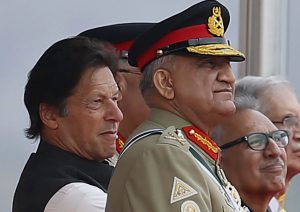Pakistan has been under a hybrid martial law regime for over two years now, and it seems that the country’s all-powerful army is unwilling to jettison its Imran Khan project. And why would they? When told by the brass to jump, the army-supported prime minister merely asks how high. While the country’s economy has been sinking since Khan occupied the country’s highest office, the army seems bent on keeping their chosen man afloat.
For all practical purposes it is already impossible to tell where the military’s rule ends and Khan’s begins, just as the befuddled animals in Orwell’s “Animal Farm” could not tell their past and current dictators apart. The most recent evidence of the hybrid nature of the current regime came with the rushed passage of legislation aimed at hounding opposition politicians under the guise of countering money laundering and terror financing.
Pakistan has been on the watchdog Financial Action Task Force’s (FATF’s) grey list for over two years. The so-called grey list implies increased monitoring of countries for “strategic deficiencies in their regimes to counter money laundering, terrorist financing, and proliferation financing.” Pakistan showed ostensible compliance with the FATF regimen via the legislation passed in September, ahead of the FATF’s October meetings. That could mean getting a clean bill and transitioning to the white list, while non-compliance could result in blacklisting that entails potentially crippling economic sanctions.
Under the garb of complying with the FATF requirements, Khan’s Pakistan Tehreek-e-Insaf (PTI) government steamrolled through eight pieces of legislation in mid-September that target the political opposition. In this effort, the PTI was helped by the army’s notorious Inter-Services Intelligence Directorate (ISI). The opposition, led by ex-Prime Minister Nawaz Sharif’s Pakistan Muslim League-Nawaz (PML-N) and including the Pakistan Peoples Party (PPP) led by Bilawal Bhutto-Zardari, claimed that its members received mysterious phone calls telling some to stay away from the parliamentary proceedings, thereby paving the way for the regime to bulldoze their way through the joint session of the parliament. The opposition had previously defeated several of the bills in the Senate – the upper house of Pakistan’s bicameral parliament – where it has a numerical majority. But by herding together the Senate with the National Assembly in a joint session, and forcing some three dozen opposition parliamentarians to stay away from the vote, the regime managed to get a wafer-thin majority to piggyback clauses that go way beyond the FATF requirements.
The approved legislation might have closed the loopholes in Pakistan’s existing laws to comply with the FATF requirements, but it has given government agencies unprecedented powers to conduct surveillance of citizens, including monitoring telecommunications and even hacking into computer systems, supposedly contingent upon permission from the courts. The approved bills ominously conflated white-collar crimes with terrorism financing and included the country’s National Accountability Bureau (NAB), which is infamous for persecuting the political opposition, as one of the prosecuting agencies for such crimes.
Still, one might ask: What is wrong with this if it helps nail the bad guys? A lot, and for that, context is important. Pakistan has a long history of coddling jihadist terrorists while harrying the political opposition, activists, and journalists.

































